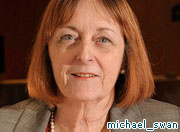Legalising euthanasia would “harm the world” for future generations, and remove any sense of “mystery” at the heart of life, a leading law professor has warned.
Writing for Canadian newspaper the National Post, Margaret Somerville said that all people, whether religious or not, “need and can experience ‘a sense of the sacred'”.
She said this distinguishes humans from animals and means we deserve “special respect”.
Innate instinct
Humans have a “strong, innate instinct against killing other humans”, she added.
Somerville said: “Euthanasia destroys any sense of there being a mystery at the heart of life”.
Euthanasia “treats us as expired products to be checked out of the supermarket of life, preferably, as one Australian politician put it, ‘as quickly, cheaply and efficiently as possible'”, she continued.
Sense of amazement
“I believe accepting euthanasia will seriously damage our sense of amazement, wonder and awe at both who we are and the universe we inhabit, and also grievously harm the world we leave to future generations”, she concluded.
Somerville also said she disagreed with euthanasia “because it’s dangerous for vulnerable people and society”.
Somerville holds professorships in the faculties of law and medicine at McGill University in Canada, and was the founding director of the McGill Centre for Medicine, Ethics and Law.
Urge
She is a speaker, consultant and researcher on issues such as euthanasia, abortion, and mental health.
Earlier this year, a Dutch academic who had previously supported legalising euthanasia in the Netherlands urged Westminster not to introduce assisted suicide, ahead of a debate in the House of Lords.
Theo Boer, who has been part of a committee monitoring euthanasia cases since 2005, said the number of such deaths in the Netherlands has soared since the legalisation of euthanasia in 2002.
Default mode
Boer has reviewed close to 4,000 euthanasia cases and said: “Euthanasia is on the way to become a ‘default’ mode of dying for cancer patients.”
A Bill to legalise assisted suicide passed its second reading in the House of Lords and is due to be looked into at committee stage next month.


